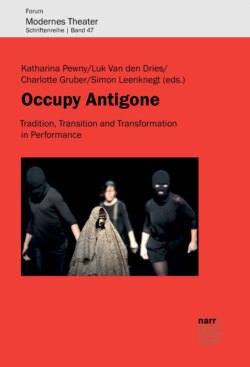Читать книгу Occupy Antigone - Группа авторов - Страница 14
На сайте Литреса книга снята с продажи.
1. Dialogues performed by ‘thinkers’: a question of dramaturgy?
ОглавлениеWhat does Antigone contribute to an understanding of the connection between theatrical and philosophical thinking? According to Jean-Luc Nancy, there is a remarkable kinship between theatre and philosophy that is founded on dialogue.1 Since the beginning of its history with the Platonic dialogue, it constitutes a certain relation. It is a relatedness that is brought forth between people and between humans and gods. Yet, the difference between philosophy and tragedy appears in two different ways to manifest that relatedness. Plato’s philosophy sets logos as dialogue, because insight and knowledge have to be gained by a dialogical activity that departs from logos and arrives at logos. Tragedy’s dialogue is informed by myth. Myth is the name that is given by Aristotle to plot.2 It is mediated by the spoken word and directed towards listeners. While Platonic dialogue claims progression to allow the argument to develop, myth does not have any progressive dimension. Taken as a story of origination or origin, myth tells what has already happened and arrives there where we are now. It does not tell anything new, it tells what is given. It tells a story whose end is given from the beginning on. It is especially striking that Nancy at this point explicitly mentions Antigone as the most exemplary tragedy.3 Taken as a story of kinship, the conflict in this tragedy is indeed already given from the beginning, because Antigone and her brother Polyneices are children and siblings of Oedipus. As this oedipal conflict of backward genealogy lies at its origin, the tragedy cannot have any progressive dimension. It is telling a story whose development is given in the same origin, and therefore also in Antigone herself. Consequently, Antigone, who is incorporating myth, is doing what she says (“I say that I did it and I do not deny it”). Embodying her saying in her acting, she is acting out poiesis. Platonic dialogue, on the contrary, is considered to be the starting point of a long, progressive history of speculative philosophy, especially in the history of Hegelian philosophy, locating the dia-logue in the realm of noein. Therefore, the Presocratic origin of the kinship between the notions of noein and poiesis became no longer accessible.4
Nancy is not the only one who situates Antigone in an exemplary way right at the threshold where the form of dialogue splits into two directions: philosophy and tragedy, logos and myth, thinking and poetizing. As we will see later in this article, Heidegger chooses Antigone to explore his considerations on the divorce of philosophy and tragedy as well, to overcome this split. Philippe Lacoue-Labarthe on his part is asking: “what has tragedy to do with the birth of speculative thinking and Onto-Logic?”5 We have now arrived at the first scene.
